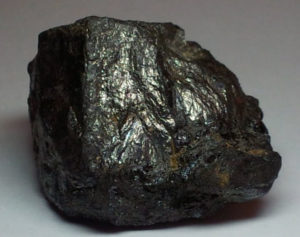I was among a small group that met recently with Arizona Congressman Paul Gosar, to talk about public land management. When the discussion turned to minerals, he picked up a dark brown rock from the Mojave Desert and passed it around, explaining that it was mostly composed of a “rare earth” element. Such rocks, he said, litter the desert by the millions, yet the United States imports 100 percent of the important mineral it contains.
 He and other leaders have been concerned for years about America’s growing reliance on China for rare earth minerals, several of which are critical in the production of renewable energy, and high-tech equipment like cell phones, computers, MRI machines, and satellites. Most Americans don’t spend two seconds worrying about where we get our supplies of these particular elements with hard-to-pronounce names, like ytterbium, dysprosium, and praseodymium. But China’s increasing use of economic espionage to steal technology has heightened concerns about the vast quantity of our imports from the land of the red dragon.
He and other leaders have been concerned for years about America’s growing reliance on China for rare earth minerals, several of which are critical in the production of renewable energy, and high-tech equipment like cell phones, computers, MRI machines, and satellites. Most Americans don’t spend two seconds worrying about where we get our supplies of these particular elements with hard-to-pronounce names, like ytterbium, dysprosium, and praseodymium. But China’s increasing use of economic espionage to steal technology has heightened concerns about the vast quantity of our imports from the land of the red dragon.
Last Fall, the Justice Department indicted 10 Chinese intelligence officers and cyber hackers from the China’s civilian espionage organization, the Ministry of State Security (MSS). They had stolen airline engine technology to aid the Chinese defense industry’s development of a copy-cat engine. Just two weeks earlier, the FBI arrested Yanjun Xu, a high MSS official who had illegally purchased General Electric commercial aviation technology. US intelligence agencies have been warning that China is using students as spies, and mining social media sites like LinkedIn and Facebook to recruit more.
But it is China’s growing dominance in manufacturing telecommunication systems that most concerns authorities around the world. That’s because it is especially easy to embed spying equipment in technological equipment like cell phones, computers, servers, and in solar panels exported around the globe.
As the United States prepares to join other western nations in deploying “5G” mobile networks, several countries (Australia, New Zealand, Canada, the UK, Poland, Norway and others) are blocking involvement of the world’s largest telecommunications equipment manufacturer, the Chinese company Huawei. Last month Canada arrested Huawei’s chief financial officer, Meng Wanzhou, for using such exports for espionage. At the same time, Polish authorities arrested Huawei’s Polish sales director for spying, and the plot is growing, in both geography and complexity.
No wonder suspicion has now focused on the same Chinese firm’s production of solar panels. Since China now makes 70 percent of the world’s solar panels, American officials worry that such panels could actually function as “sleeper agents” for disrupting the U.S. electrical grid. Considering how small modern cameras, microphones, and transmitters can be, these warnings are not as far-fetched as they might have seemed a few years ago.
A bipartisan group including Senators Tom Cotton and Chris Van Hollen, and Representatives Mike Gallagher and Ruben Gallego, introduced legislation to ban the export of U.S. components to any Chinese telecommunications company that violates U.S. sanctions or export control laws. The bills specifically cite Huawei and another Chinese firm, because the components they make could be used to spy, or to trigger power outages.
All of which brings us back to the question of why we rely so heavily on China in the first place. America’s economy is heavily dependent upon energy and telecommunications, but does that require Chinese manufacturing? Clearly not. America has its own plentiful supplies.
In Congressman Gosar’s office, the only thing really remarkable about the “rare earth” rock is that it isn’t rare at all. The term “rare earth” is a misnomer, applied to 17 specific minerals because they were once considered difficult to extract from the surrounding rock in which they are found. But supplies abound worldwide, including all across the U.S., where our known reserves are at least ten times the entire world’s production.
China now produces 80-90 percent of the world’s rare-earth minerals, according to the U.S. Geological Survey. Yet China has only about 37 percent of the world’s estimated reserves. For decades, the U.S. supplied the world, mostly from one mine at Mountain Pass, California. Then, China started exporting rare earths, driving prices down and bankrupting that mine in 2002. The U.S. also had a national defense stockpile, but sold it all in 1998, while the last American processing plant in Texas was closing.
The mining process is expensive and subject to extreme market fluctuations, so the U.S. has simply let China have that market. As we are now realizing, that is not smart, it is not safe, and it is completely avoidable.
This column first appeared in the Grand Junction Daily Sentinel April 19, 2019.




Comments on this entry are closed.